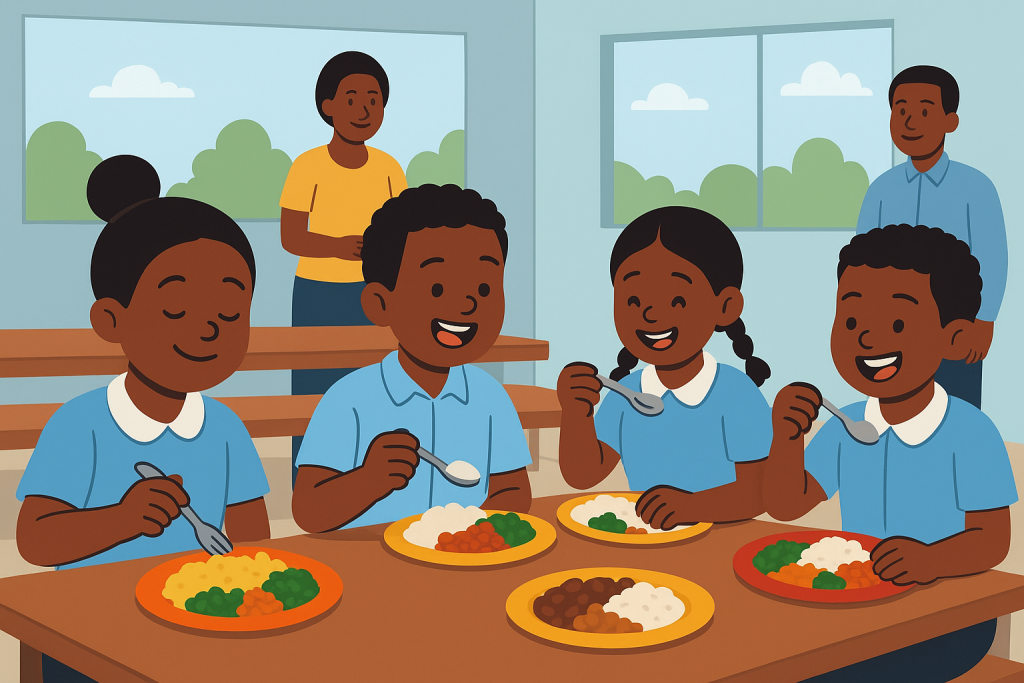Massive Expansion for School Feeding Program
The Federal Government of Nigeria is working to expand the National Home-Grown School Feeding Programme (NHGSFP) to reach 50 million primary school pupils in 2026. This plan was confirmed by Dr. Aderemi Adebowale, the National Programme Manager of the National Social Investment Programme Agency (NSIPA).
Currently, about 8.6 million pupils benefit from the programme across 56,000 public primary schools in 35 states.
Who Will Be Included
Adebowale said the expansion will cover pupils in Primary 1 to 3 and Primary 4 to 6. She also added that out-of-school children will be gradually integrated.
She said the programme will ensure children receive a nutritious meal per school day. Plans include aligning smallholder farmers, aggregators, and supply chains to keep prices affordable and food quality good.
Cost & Affordability
The target cost per child is expected to range between ₦500 to ₦1,000 per meal. Even at ₦500, the government believes the cost is low enough to deliver nutritious and delicious meals.
To achieve cost controls, NSIPA plans to coordinate pricing across suppliers, farmers, and vendors. This measure aims to avoid inflated or market-driven prices for ingredients.
Linking with Out-of-School Initiatives
In addition to feeding primary school pupils, the expansion includes efforts to feed out-of-school children. An existing initiative, the Renewed Hope National Home-Grown School Feeding Project (RH-NHGSFP), seeks to provide food for 20 million out-of-school and underserved children by 2026.
The RH-NHGSFP is managed by NSIPA in partnership with the National Commission for Almajiri and Out-of-School Children Education, and with support from the National Identity Management Commission (NIMC) for registration and verification.
Expected Benefits
This expansion could bring many benefits. First, more pupils will enjoy daily meals, reducing hunger and improving nutrition. When children are well-fed, their ability to focus in class often improves.
Second, school attendance and enrollment are expected to rise. Parents may be more motivated to send children to school when free lunches are available.
Third, local farmers will likely gain from increased demand. Sourcing food locally supports agriculture and stimulates rural economy.
Challenges to Overcome
Despite the positive plan, challenges remain. Ensuring consistent funding is critical. The programme must secure enough money in budgets and avoid delays.
Logistics is another concern. Distributing meals to remote or rural schools — sometimes without good roads — will require good planning and strong partnerships.
Quality control is also essential. Meals must meet nutrition standards and hygiene requirements. Vendor and cook training, monitoring, and strong oversight will be important to prevent food safety issues.
What Nigerians Should Expect Next
NSIPA has pledged to work closely with state governments, community groups, and farmers to ensure smooth implementation.
Beneficiary schools will likely receive updates soon about registration, supply arrangements, and how meals will be delivered.
Also, citizens should expect increased transparency. Adebowale affirmed that payments and service delivery will be tracked and monitored to avoid corruption or misuse.
The decision to scale up the NHGSFP to 50 million primary school pupils by 2026 is ambitious, but it holds real promise. If successful, it could help reduce hunger, improve education outcomes, and boost local food systems across Nigeria.
Still, achieving this goal will require strong collaboration, solid funding, and effective supervision.
For many parents and pupils, the expansion isn’t just policy talk—it could mean daily meals, better schooling, and a future with fewer barriers to learning.



